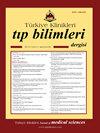COVID-19 and Iron Metabolism: Traditional Review
Q4 Medicine
引用次数: 2
Abstract
Viruses invade cells to reproduce, and they require an iron-filled cell for efficient reproduction. Together with other viruses, the coronavirus disease-2019 (COVID-19) virus can alter the expression of proteins involved in iron homeostasis. For example, in COVID-19 patients, an increase in pro-inflammatory cytokines such as interleukin-6 may stimulate the synthesis of hepcidin, the regulatory hormone of iron metabolism, thereby suppressing ferroportin-mediated cellular iron export. Increased serum levels of ferritin in COVID-19 virus infection is associated with a poor prognosis and may be partly due to the virus itself. Some viruses selectively infect iron acceptor cells (e.g. macrophages) by binding to transferrin receptor 1 during cell entry. Moreover, human airway secretions in the major route of entry of COVID-19 include transferrin and lactoferrin, and this glycoproteins can bind iron and maintain a chemically inert form. Understanding how iron metabolism and viral infection interact in the COVID-19 outbreak may suggest new ways to control the disease.COVID-19与铁代谢:传统综述
病毒侵入细胞进行繁殖,它们需要一个充满铁的细胞才能有效地繁殖。2019冠状病毒病(COVID-19)与其他病毒一起,可以改变参与铁稳态的蛋白质的表达。例如,在COVID-19患者中,白细胞介素-6等促炎细胞因子的增加可能刺激铁代谢调节激素hepcidin的合成,从而抑制铁转运蛋白介导的细胞铁输出。COVID-19病毒感染时血清铁蛋白水平升高与预后不良有关,部分原因可能是病毒本身。一些病毒在进入细胞时通过结合转铁蛋白受体1选择性感染铁受体细胞(如巨噬细胞)。此外,在COVID-19的主要进入途径中,人类气道分泌物包括转铁蛋白和乳铁蛋白,这些糖蛋白可以结合铁并保持化学惰性形式。了解铁代谢和病毒感染如何在COVID-19爆发中相互作用,可能为控制疾病提供新的方法。
本文章由计算机程序翻译,如有差异,请以英文原文为准。
求助全文
约1分钟内获得全文
求助全文

 求助内容:
求助内容: 应助结果提醒方式:
应助结果提醒方式:


